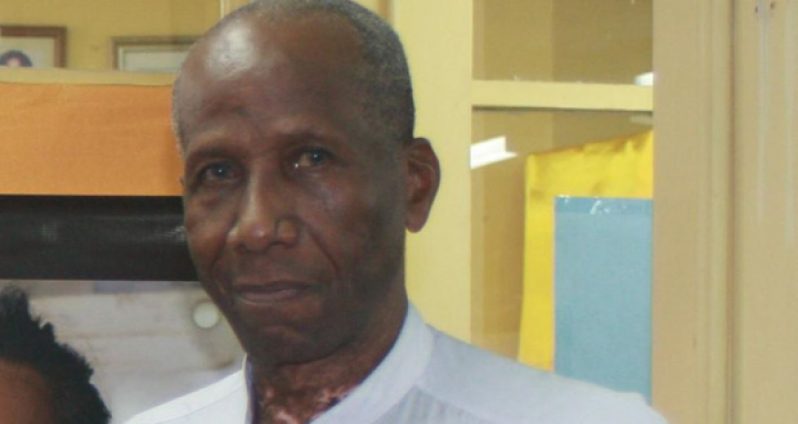– A tribute to Sheldon McDonald
By Karl Salmon
IT ALWAYS seems to happen: We procrastinate expressing our love and appreciation to our family and friends until suddenly the opportunity fades away and that moment is lost. We then struggle with the old adage: If I could, I would, I should.
This is my tribute to a dear friend who shaped my character and capabilities during my youth. He was also a friend of Jamaica, Guyana, and the Caribbean.
My growth needed fine-tuning for me to develop into a productive and meaningful youth with a keen sense of purpose. It really does take a village to raise a child, and I found my little settlement in a group of politicians who occasionally assembled at a popular ‘watering hole’ to engage in various chatter. I was fascinated to be in their presence, and they welcomed this young gofer to fetch their various orders of beverages.
There was this particular drink that caught my interest: a simple mixture of Appleton white rum and milk served on ice. It was a favourite among the men, and my taste buds were curious to find out more about its appeal. Anyway, I will get back to this drink later.
Among the political technocrats was a gentleman who stood out during the various engagements. He was highly articulate in his arguments, which were occasionally punctuated with timely posturing for effect. I gravitated towards him because he not only commanded attention, but was somehow able to make you believe that what he was saying was gospel (so to speak). He nicknamed me ‘Carlos’ and the name stuck among the men.
His name is Sheldon McDonald. Every evening I would absorb the various discussion, style, and substance of their arguments, particularly Sheldon’s. He eventually took me under his wing, and nurtured my young and enthusiastic mind to enhance my verbal and written expressions, as well as my deportment.
While an accounting clerk at the Ministry of Foreign Affairs and Foreign Trade, the Ministry issued an invitation among staff to participate in a mock conference. This invitation (expressed but not written) was opened to the higher levels of staff from the various specialized departments: Economic, Trade, Political, and Consular, and who were university graduates with various acumens; accounting clerks with high school diplomas need not apply.
I became a nuisance to the Director of Inspectorate, the Director of Human Resources and the Director General, presenting a case why I felt I should be considered for selection. A few days after, I was chosen to be the Prime Minister of Australia. The conference was to begin in two weeks.
Sheldon invited me to his office and gave me a number of documents to proofread. Some were speeches he had prepared, and he wanted me to make sure they had no grammatical or spelling errors, and to ensure that the sentences flowed. After spending 6 hours reviewing those wretched documents, I found no flaws. It turned out there was none — he just wanted me to read and understand the various components of writing.
We spent continuous evenings and nights at his office and home drafting, redrafting, and rehearsing the script for the conference, with the occasional break for him to enjoy his favourite drink. Finally, Sheldon gave me his blessings — that I was prepared.
The morning of the conference was terrifying, but I somehow had a good feeling deep inside. During my opening remarks, I paid tribute to Australia and Canada’s prime ministers for their peace-keeping efforts and their commitment to end world tyranny. This received a warm applause. I felt great. At the end of my presentations, I received a standing ovation. I had exceeded the expectations of an accounting clerk.
Three months after, I was summoned into the office of the Director of HR. I was being considered for overseas assignment, and would begin training the following week. A year after, I was posted to the Jamaican Consulate General in Miami, then reassigned to the Permanent Representative to the United Nations (Jamaican Embassy) in Geneva, Switzerland.
I could not have achieved this without the invaluable influence of Sheldon McDonald.
Our lives drifted apart, and Sheldon began work with CARICOM and the Caribbean Court of Justice. He eventually settled as the Head of The University of Guyana Law Department. We kept in contact, but sporadic, and not as often as I should have. In November last year, I read that Sheldon had passed away under tragic circumstances. I was in pain. My mind flashed back to his many guiding lights: Sheldon had taught me the importance of voice inflection to emphasize a point;
pausing between points to allow the audience to absorb them; insertion of humour at the appropriate time, to create relaxation; if you were uncomfortable making eye contact, stare directly at the centre of their forehead slightly above the eyes to create the impression that you were making eye contact; when asked a critical question, always analyse if the person needs to know, or simply wants to know.
Sheldon had taught me how to drive standard shift on the precarious Jamaican country roads. He taught me how to play dominoes – shuffle, read the game, block, and colt.
Sheldon, your influence is not lost. In fact, I have made the commitment to pay it forward and continually reference your contributions to my life and the lives of many who came across your path.
Ladies and gentlemen, please allow me to raise this glass of white rum and milk on ice in a toast to Sheldon: To you, Sir, with love.


.jpg)











